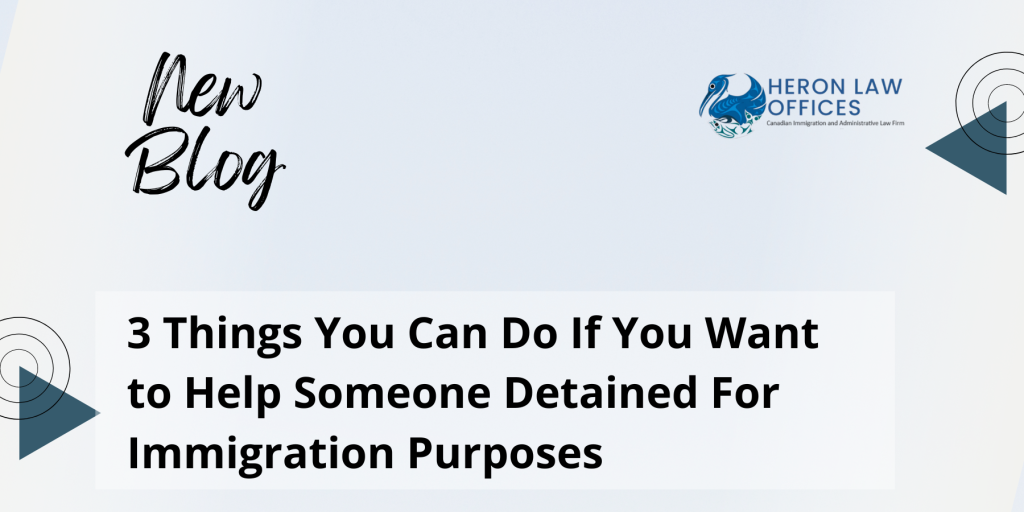
Canada Boarder Services Agency (CBSA) may detain a foreign national or permanent resident on various grounds. A person will be detained if the CBSA officer has reasonable grounds to believe that:
- They are unlikely to appear for examination, hearing or removal (flight risk)
- They are considered a danger to the public (criminality)
- They are inadmissible: on various grounds such as criminality, security, health or financial reasons
- They haven’t established their identity to the satisfaction of the officer
Foreign nationals or permanent residents who are detained by CBSA appear before the Immigration Division (ID) of the Immigration and Refugee Board of Canada (IRB). The person detained for immigration purposes is held in a minimum-security immigration holding centre – the IHC of the Vancouver area is located in Surrey.
Within 48 hours of having been placed in detention by CBSA, the person concerned will appear in front of one of the ID’s members (decision-makers) to review the evidence gathered by CBSA and assess if the person should be released of kept detained. If the member decides that the person should remain detained, they will be brought in front of another member within 7 days, and if still detained, within every 30 days thereafter. Each time the person detained appears in front of the ID, the board member must consider the reasons the person is detained, as well as some other factors mentioned in the Immigration and Refugees Protection Act. Every detention review is an opportunity for CBSA to provide development on the case, either after further investigation or in the effort of obtaining a travel document for the person subject to a removal order. It is also an opportunity for the person detained to present an alternative to detention so that they can be released.
The process of detention reviews is adversarial between the Minister’s counsel for CBSA, who will present arguments about why the person should remain detained, and the person detained, who can be represented by counsel, and who will respond and offer an alternative to detention, if possible.
Often, the alternative to detention offered encompass the presence of a bondsperson. This trustworthy person has the responsibility of exerting influence on the detained foreign national or permanent resident and help them insure they respect the conditions of their release, imposed by the ID member.
There are different ways you can help and prepare if you want to act as a bonds person. Here are 3 things you can do to improve the chances of release:
- Know the details of the detained person’s situation. This is crucial as you will be questioned by CBSA and called to testify in front of the board member at the detention review. The member will assess your credibility and capacity of positively influencing the released person to respect the imposed conditions.
- Put some money aside. Members often order that a bond is paid by the bondsperson. This bond can either be a cash bond – required to make sure that the released person respects the conditions of their release. It there is a breach of conditions, the Government of Canada will keep the money and the person will be arrested and detained once more. The bond may also be asked as a performance bond – where the bondsperson signs a document that is a promise to pay the offered amount. If there is a breach of conditions, the Government of Canada will collect the money and the person will be arrested and detained once more.
- Prepare a short release plan. This will help convince the member that you are ready and prepared to welcome the person released and act as a bondsperson. The plan might include the type of accommodation that you will be providing for that person, the “supervision” time that you or someone in your household is disposed to offer and any other kind of incentives that you may envisage to help the person respect the imposed conditions. Bear in mind that such a conditions could be to present themselves to CBSA officers to be sent back to their country of origin, once the removal become effective.
Being well prepared to act as a bondsperson is decisive in increasing the chances of release of a detained person. Retaining the services of an experienced counsel can greatly help you to achieve this goal.
Disclaimer:
The information on these pages is for general use only and should not be relied upon as legal advice. It does not establish a lawyer-client relationship. No information from this website, emails, or other correspondence from Heron Law Offices (HLO) except professional legal advice given during a formal consultation or a retainer agreement constitutes legal advice. HLO disclaims any liability from reliance on such information.
If you need to consult with one of our Canadian Immigration and Refugee Lawyers, please book it below:



